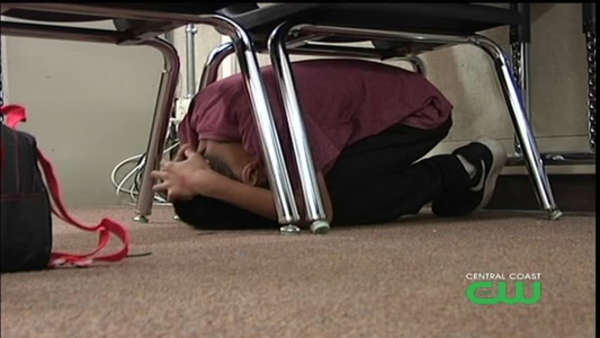One can never be ready for natural disasters like earthquakes as they strike when we are least aware. A little knowledge and some simple precautions though can help you survive when the Big One strikes. Use these tips to prepare yourself for an earthquake anywhere you are.
Before An Earthquake:
- Be prepared to act. Know how to act so your response is automatic. Identify safe places to ‘Drop, Cover and Hold On.’ Know at least two ways to exit the building safely after an earthquake.
- Stock up on emergency supplies. Keep the basics: flashlight, first-aid kit, whistle,gloves, goggles, blankets and sturdy shoes. Coordinate supplies with your work group or department. Plan as if food and water may not be available for about 24 hours and other supplies for up to 3 days.
- Arrange your work area for safety. Make sure that bookcases, large file cabinets and artwork are anchored. Store heavy objects on low shelves. Store breakable objects in cabinets with latches.
During An Earthquake:
- Remain calm as the quake occurs, others will respond to your actions. A cool head can prevent panic. If you are indoors when the shaking occurs, stay there. Move away from windows and unsecured tall furniture. Drop, cover and hold on under a desk, a table or along an interior wall. Protect your head,neck and face. Stay under cover until the shaking stops and debris settles.
- If you are outdoors, move to an open area away from falling hazards such as trees, power lines, and buildings. Drop to the ground and cover your head and neck.
After An Earthquake:
- Remain calm and reassuring. Check yourself and other for injuries. Do not move injured people unless they are in danger. Use your training to provide first aid, use fire extinguishers, and clean up spills.
- Expect aftershocks. After large earthquakes, tremors and aftershocks can continue for days.
- Be ready to act without electricity or lights. Be aware of objects that have shifted during the quake.
- If you must leave a building, use extreme caution. Continually assess your surroundings and be on the lookout for falling debris and other hazards. Take your keys, personal items and emergency supplies with you if safe to do so. Do not re-enter damaged buildings until an all clear is given.
- Use telephones only to report a life-threatening emergency.










